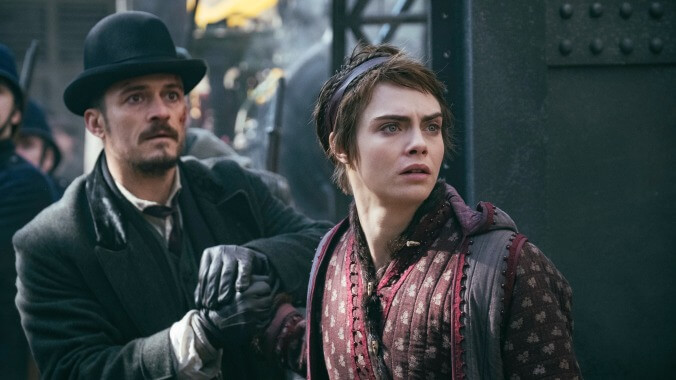Amazon’s Carnival Row might work better if it went completely off the rails


Carnival Row began as a spec script for a feature film by Travis Beacham (who wrote the treatment for Pacific Rim), titled A Killing On Carnival Row, before being picked up as a TV series by Amazon in 2015. The premise, that of a neo-noir fantasy drama, attracted king of the cinematic monsters Guillermo del Toro, who was set to co-wrote the series with Beacham and The 4400 creator René Echevarria. The creative lineup has changed in the last four years, with del Toro bowing out over scheduling issues and Jon Amiel taking over as series director for Paul McGuigan. Echevarria also seems to have taken a step back, as Marc Guggenheim now shares executive producing duties with Beacham on the soon-to-debut series.
Such changes are fairly common, especially on long-gestating projects, but in the case of Carnival Row, they represent not just more promising paths, but how the winding journey can take some of the magic out of an idea. The scope of the fantasy series—both in terms of time, budget, and world-building—would have been an ideal playground for del Toro, whose specter looms over the proceedings, though there’s nothing nearly so memorable as the faun of Pan’s Labyrinth lurking in any of the many corners the series turns. An extensive mythology is hinted at by the way the characters—whose names seem to have been generated by a story bot fed a steady diet of Charles Dickens and Harry Potter books, with a dash of steampunk—talk to one another. There are many flashbacks, including one that runs the full length of an episode, to the beautiful land of Tirnanoc, which was destroyed by war and human avarice. Kobolds perform in a traveling troupe, while fairies sing to packed theaters. At one point, we see Jared Harris with a pet bear; elsewhere, series leads Orlando Bloom and Cara Delevingne consult what appears to be their world’s version of The Kama Sutra. Carnival Row has the makings of what should be an absolute bonkers show, but in its first season, it struggles to rise above being merely strange and unwieldy.
Bloom stars as Rycroft “Philo” Philostrate, a police inspector with all the charm you’d expect from someone named Rycroft Philostrate (maybe even less). As Legolas, Bloom was hardly the soul of the Lord Of The Rings trilogy, but he did come across as both ethereal and personable. Here, he trades any semblance of personality for a mask of grim determination, which often just looks like the pained expression of someone with gastrointestinal troubles. He’s consumed by two mysteries, that of finding out who’s killing humans and Faefolk (as non-humans like fairies and fawns are referred to), and uncovering his own hidden past. Philo also finds himself caught between the colonialist humans of the Burgue and the Fae (as the fairies are more specifically known) whose homeland they invaded, forcing them to flee to the Burgue (capital of the Republic Of The Burgue) where they’re discriminated against and relegated to the eponymous Row. No wonder Philo always looks like he could use an antacid.
On the other side of the divide is the even more improbably named Vignette Stonemoss (Delevingne), an erstwhile librarian and Fae freedom fighter who’s increasingly morally compromised. She never looks like she’s coming down with food poisoning, though—Delevingne’s preternatural looks lend themselves well to her role as one of the Faefolk, but she also gives a more nuanced performance than a lot of the writing supports. Vignette is scrappy: She knows when to keep her head down, and when to engage in an aerial fight with another fairy (another moment that should be much more fun than it sounds). She and Philo are star-crossed lovers—hence the cribbing from the Fae Kama Sutra—who can’t quit each other, though the chemistry between Bloom and Delevingne never really ignites.
There are many, many more characters, including Harris’ Absalom Breakspear, a member of the Commonwealth Party and chancellor of the Parliament. Compassionate but somewhat ineffectual, Absalom spends much of the season fending off political attacks from the Opposition, led by Ritter Longerbane (Ronan Vibert). The wedge issue is, naturally, immigration—the chancellor thinks the Burgue should provide a haven for refugees like the fawns and Fae, given that they’re victims of destabilization by a foreign military power. Longerbane and his ilk would rather force them into indentured servitude or ban them moving into the Burgue altogether; they use slurs like “puck” and “critch” to further their dehumanization campaign. And because next to every man in power there is a woman who would also like some, Indira Varma (as Piety Breakspear, the chancellor’s wife) and Caroline Ford (as Longerbane’s daughter Sophie) cook up some intrigue of their own.
Does that sound like a very different show from the one in which a fairy librarian and a sad boy detective fool around in the stacks when they’re not tracking down a savage killer? Yes, but these are only two of the concepts that Carnival Row tries to merge together like a Frankenstein monster. In addition to the racial allegory, supernatural romance, and Ripper Street-like murder mystery, the show also attempts to recreate the cutthroat chicanery of Game Of Thrones. It’s a lot, and yet still not enough: the scheming and trysts and suspense (what there is of it) never quite add up to a truly immersive experience. The allegorical element, despite being present throughout, is the most underdeveloped. The Fae don’t just represent migrants from the 20th and 21st centuries; Beacham and his writers, including Stephanie K. Smith and Marc Bernardin, take inspiration from Irish history and culture (it’s no coincidence that a show that’s in part about imperialism has a Victorian aesthetic). But Carnival Row doesn’t have a firm grasp of its -isms: in addition to speciesism that stands in for racism, there’s just racism. Gender inequality is never invoked outright, but many female characters, including a socialite played by Tamzin Merchant, have less agency than their male counterparts. And yet, women serve in this analog of 19th-century British Parliament.
These muddled parallels ultimately undermine much of Carnival Row’s social commentary, which would be less of an issue if the fantasy drama element was more engrossing. The murder mystery is probably the most successful element, even as it builds to a fairly obvious conclusion. There are several good performances throughout, though Harris seems slightly aware of the step down this represents from The Terror, storytelling-wise. As it stands, season one offers an outline for the type of show Carnival Row wants to be—mixed genres and all—instead of the Thrones successor Amazon is banking on with an early renewal.